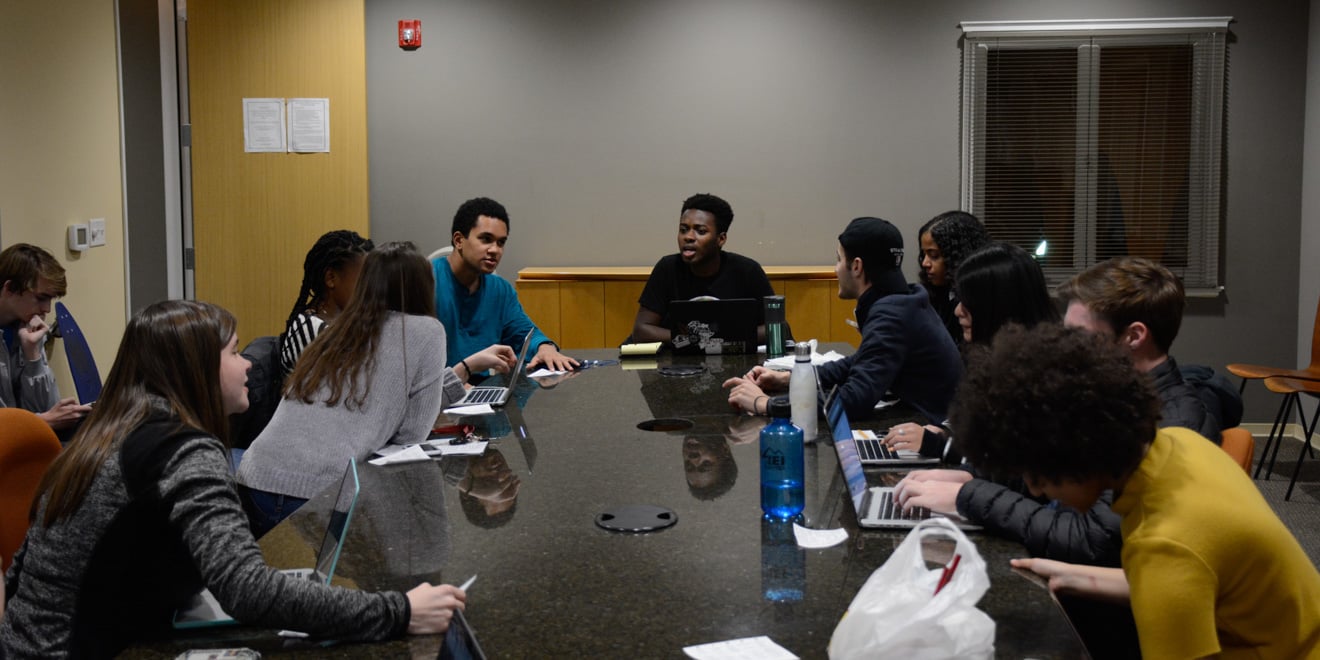In its penultimate meeting, the 19th Undergraduate Senate introduced a bill that would give Senators the power to financially penalize student groups that invite guests perceived to be in violation of the Fundamental Standard, a University statement guiding student conduct since 1896.
The bill, co-authored by Erica Scott ’20, Hamzeh Daoud ’20, Remy Gordon ’20 and Katie Hufker ’19 and sponsored by Kimiko Hirota ’20, reaffirmed President Marc Tessier-Lavigne and Provost Persis Drell’s statement supporting “free speech and an inclusive culture,” but noted that some students have raised concerns about the behavior of invited campus guests in the past. This behavior includes the publicizing of identifiable student information online, an action that “[has] the potential to jeopardize the safety of students.”
The bill adds that Stanford already holds individual students responsible for the behavior of their guests while on campus, and that this responsibility extends to student organizations.
If the bill passes, the Senate would be able to censure student groups whose guests commit specific actions listed by the Office of Community Standards (OCS) to be in violation of the Fundamental Standard. These actions include physical assault, threats, hazing and hate crimes.
After consultation with OCS and a two-thirds Senate agreement, Senators would then be able to impose a funding penalty on the offending student group, which at a maximum would restrict its ability to apply for grants for that quarter and the next.
Senator Chapman Caddell ’20 questioned whether it is within the Senate’s jurisdiction to arbitrate matters concerning the Fundamental Standard.
“We have every reason to believe that someday, by the authority of 15 senators yet unknown, the Fundamental Standard would be used as a bludgeon against groups guilty of no greater crime than offense to the Senate,” Caddell said. “Whether or not the bill before us is constitutional, it certainly violates the basic principles of American democracy. We punish all members of a group for decisions made by its leadership.”
Other senators, including Ana Carolina Queiroz ’20, questioned whether it would be possible for OCS to determine whether campus guests violate the Fundamental Standard. Senators also asked whether the bill has the potential to influence the types of speakers student groups bring to campus, given that Scott said she envisioned it as a “deterrent.”
“We need to take into account … retaliatory action and the chilling effect it can potentially have on free speech,” Appropriations Committee Chair Gabe Rosen ’19 said. “After this [bill passes,] there are going to be a lot of groups beyond the one directly affected that will look at what we did and think, ‘Okay, how do we conform to the subjective standard? Should we even bother trying to bring a speaker if we might have our funding reduced?’”
In defense of the bill she co-authored, Scott emphasized that, in order to be disciplined by the Senate, a group’s guest would need to specifically violate one of the actions listed by OCS. She added that the bill is still in early stages and “open to improvement.”
“It wasn’t my intention to make this a bill about speakers at all,” Scott said. “In terms of [it being a] deterrent, it’s not trying to limit people who have controversial opinions. It would be limiting people who have the likelihood of committing any of these actions … I don’t think this bill is intended to limit speech whatsoever.”
The Senate also passed bills to adopt Rosenberg’s Rules of Order in Senate meetings and to allocate funding for a spring quarter leadership class.
Contact Erin Woo at erinkwoo ‘at’ stanford.edu.
